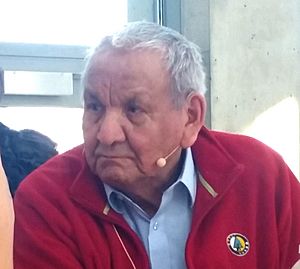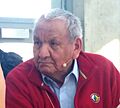Alex Janvier facts for kids
Quick facts for kids
Alex Janvier
CM AOE RCA
|
|
|---|---|

Janvier in 2017
|
|
| Born | February 28, 1935 Le Goff Reserve, Cold Lake First Nations, Alberta, Canada
|
| Died | July 10, 2024 (aged 89) |
| Education | Self taught, Alberta College of Art and Design |
| Known for | Painter |
| Movement | Indian Group of Seven |
| Awards | Honorary degrees from
|
Alex Simeon Janvier (February 28, 1935 – July 10, 2024) was a famous First Nations painter from Canada. He was part of a group called the Indian Group of Seven. Alex Janvier helped create modern Aboriginal art in Canada, making it known around the world.
Contents
Alex Janvier's Art Journey
Alex Janvier was born on February 28, 1935. His home was the Le Goff Reserve, which is part of the Cold Lake First Nations in northern Alberta. His family was of Dene Suline and Saulteaux descent.
When he was eight years old, Alex went to the Blue Quills Indian residential school. This school was near St. Paul, Alberta. The principal there noticed Alex's amazing talent for art. The principal encouraged him to keep drawing and painting.
Alex later went to the Provincial Institute of Technology and Art in Calgary. This school is now called the Alberta University of the Arts. There, he learned about European modern art styles. But Alex also used the rich traditions of his Dene culture in his art. He graduated with high honours in 1960.
He was one of the first First Nations artists in Canada to go to a professional art school. After graduating, he taught art at the University of Alberta. In 1966, the Canadian government asked him to create 80 paintings. He also helped bring together other artists for the Expo 67 world fair. These artists included Norval Morrisseau and Bill Reid. Today, Alex Janvier's family runs the Janvier Gallery in Cold Lake, Alberta.
In 2016, a special show of his art opened at the National Gallery of Canada. This type of show looks back at an artist's whole career. Also in 2016, a huge mosaic by Janvier was put in Rogers Place in Edmonton. It is called Tsa Tsa Ke Kʼe, which means Iron Foot Place.
What Was Alex Janvier's Art Style Like?
Alex Janvier is known as the "first Canadian native modernist." He created a very special and unique art style. He called it his own "visual language." This style was inspired by the deep cultural and spiritual ways of the Dene people. His art often used abstract shapes and colours.
His abstract style was perfect for very large paintings. He also made art that looked like magic and some three-dimensional pieces. Two Western artists who influenced him were Paul Klee and Wassily Kandinsky. From Native traditions, he loved the patterns found in hide-painting, beadwork, and quillwork.
Art and Activism
From 1966 to 1977, Alex Janvier signed his paintings with his treaty number. He did this to protest how the government treated Aboriginal people. He also used names for his art that hinted at treaty agreements. For example, one title was "Sun Shines, Grass Grows, Rivers Flow." This showed how his abstract art was connected to important political issues.
A Special Painting: Morning Star
In 1993, a very large abstract painting by Janvier was put in the Canadian Museum of History. It is called Morning Star. This painting is in the Grand Hall, under a seven-story-high dome. Alex created this painting with help from his son, Dean.
He named it Morning Star because the morning star helps people find their way. He planned the four colours in the outer ring to show different times in Native history:
- Yellow: For early history, when people lived in harmony with nature.
- Blue: For the changes that happened when Europeans arrived.
- Red: For a time of hope and new beginnings.
- White: For peace and returning to harmony.
Awards and Recognition
Alex Janvier received many awards for his art and his contributions:
- 2018: Member of the Alberta Order of Excellence
- 2008: Marion Nicoll Visual Art Award
- 2008: Honorary Doctor of Laws degree from the University of Calgary
- 2008: Governor General's Awards in Visual and Media Arts
- 2008: Honorary Doctor of Laws degree from the University of Alberta
- 2007: Member of the Order of Canada
- 2005: Centennial Medal for service to Alberta
- 2002: National Aboriginal Achievement Award
- 2001: Tribal Chiefs Institute Lifetime Achievement Award
- 2001: Cold Lake First Nations Lifetime Achievement Award
- 1992: Royal Canadian Academy of the Arts
Alex Janvier on Screen
Alex Janvier's work has been featured in several films and television shows:
- 2005: CBC ArtSpot
- 2004: The Sharing Circle, a segment about Alex Janvier
- 1991: Investment in Art, Alberta Art Foundation
- 1991: Echo Des Songes, by Arthur Lamothe
- 1984: Seeing It Our Way: Alex Janvier, CBC Edmonton
- 1983: Our Native Land: Alex Janvier, CBC/CBO
- 1973: Canadian Indian Canvas, Henning Jacobsen Productions
- 1973: Colours of Pride, National Film Board of Canada
- 1973: Alex Janvier: The Native Artist, Alberta Native Communications Society
Where to See His Art
Alex Janvier's art is displayed in many important collections. These include:
- Art Gallery of Alberta, Edmonton
- Canadian Museum of History, Gatineau
- Glenbow Museum, Calgary
- McMichael Canadian Art Collection, Kleinberg
- Montreal Museum of Fine Arts, Montreal
- National Gallery of Canada, Ottawa
- Thunder Bay Art Gallery, Thunder Bay
- Winnipeg Art Gallery, Winnipeg
Images for kids
 | Jackie Robinson |
 | Jack Johnson |
 | Althea Gibson |
 | Arthur Ashe |
 | Muhammad Ali |


